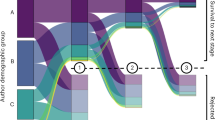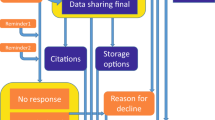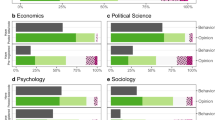Abstract
Using a database of open data policies for 199 journals in ecology and evolution, we found no detectable link between data sharing requirements and article retractions or corrections. Despite the potential for open data to facilitate error detection, poorly archived datasets, the absence of open code and the stigma associated with correcting or retracting articles probably stymie error correction. Requiring code alongside data and destigmatizing error correction among authors and journal editors could increase the effectiveness of open data policies at helping science self-correct.
This is a preview of subscription content, access via your institution
Access options
Access Nature and 54 other Nature Portfolio journals
Get Nature+, our best-value online-access subscription
$29.99 / 30 days
cancel any time
Subscribe to this journal
Receive 12 digital issues and online access to articles
$119.00 per year
only $9.92 per issue
Buy this article
- Purchase on Springer Link
- Instant access to full article PDF
Prices may be subject to local taxes which are calculated during checkout


Similar content being viewed by others
Data availability
The data to reproduce the results of this study are available on the Open Science Framework (https://doi.org/10.17605/OSF.IO/8BRYS) and were shared with the editor and reviewers on submission.
Code availability
The code to reproduce the results of this study are available on the Open Science Framework (https://doi.org/10.17605/OSF.IO/8BRYS) and were shared with the editor and reviewers on submission.
References
Hardwicke, T. E. et al. Analytic reproducibility in articles receiving open data badges at the journal Psychological Science: an observational study. R. Soc. Open Sci. 8, 201494 (2021).
Enserink, M. Sea of doubts. Science 372, 560–565 (2021).
Buxton, R. T. et al. Avoiding wasted research resources in conservation science. Conserv. Sci. Pract. 3, 1–11 (2021).
Tai, T. C. & Robinson, J. P. W. Enhancing climate change research with open science. Front. Environ. Sci. 6, 1–5 (2018).
Popkin, G. Data sharing and how it can benefit your scientific career. Nature 569, 445–447 (2019).
Wilkinson, M. D. et al. The FAIR Guiding Principles for scientific data management and stewardship. Sci. Data 3, 160018 (2016).
Roche, D. G. et al. Slow improvement to the archiving quality of open datasets shared by researchers in ecology and evolution. Proc. R. Soc. B Biol. Sci. 289, 20212780 (2022).
Tedersoo, L., Küngas, R., Oras, E., Köster, K. & Helen, E. Data sharing practices and data availability upon request differ across scientific disciplines. Sci. Data 8, 1–11 (2021).
Christian, T. M., Gooch, A., Vision, T. & Hull, E. Journal data policies: exploring how the understanding of editors and authors corresponds to the policies themselves. PLoS ONE 15, 1–15 (2020).
Sholler, D., Ram, K., Boettiger, C. & Katz, D. S. Enforcing public data archiving policies in academic publishing: a study of ecology journals. Big Data Soc. 6, 1–18 (2019).
Postma, E., Gonzalez‐Voyer, A. & Holman, L. A comment on The adaptive value of gluttony: predators mediate the life history trade‐offs of satiation threshold by Pruitt & Krauel (2010). J. Evol. Biol. 34, 1989–1993 (2021).
Stodden, V., Seiler, J. & Ma, Z. An empirical analysis of journal policy effectiveness for computational reproducibility. Proc. Natl Acad. Sci. USA 115, 2584–2589 (2018).
Rohrer, J. M. et al. Putting the self in self-correction: findings from the Loss-of-Confidence Project. Perspect. Psychol. Sci. 16, 1255–1269 (2021).
Vazire, S. A toast to the error detectors. Nature 577, 9 (2020).
Culina, A., van den Berg, I., Evans, S. & Sánchez-Tójar, A. Low availability of code in ecology: a call for urgent action. PLoS Biol. 18, e3000763 (2020).
Roche, D. G. et al. Paths towards greater consensus building in experimental biology. J. Exp. Biol. 225, jeb243559 (2022).
Laurinavichyute, A., Yadav, H. & Vasishth, S. Share the code, not just the data: a case study of the reproducibility of articles published in the Journal of Memory and Language under the open data policy. J. Mem. Lang. 125, 104332 (2022).
Roche, D. G., Kruuk, L. E. B., Lanfear, R. & Binning, S. A. Public data archiving in ecology and evolution: how well are we doing? PLoS Biol. 13, e1002295 (2015).
Besançon, L., Bik, E., Heathers, J. & Meyerowitz-Katz, G. Correction of scientific literature: too little, too late! PLoS Biol. 20, e3001572 (2022).
Holmes, N. P. I critiqued my past papers on social media—here’s what I learnt. Nature 595, 333 (2021).
Teixeira da Silva, J. A. & Al-Khatib, A. Ending the retraction stigma: encouraging the reporting of errors in the biomedical record. Res. Ethics 17, 251–259 (2021).
Minocher, R., Atmaca, S., Bavero, C., McElreath, R. & Beheim, B. Estimating the reproducibility of social learning research published between 1955 and 2018. R. Soc. Open Sci. 8, 210450 (2021).
Montgomerie, R. From the Editor’s desk of The American Naturalist: data transparency 2020. The American Naturalist http://comments.amnat.org/2021/01/note-since-fall-2020-robert-montgomerie.html (2021).
R Project. R version 4.0.3 https://cran.r-project.org/bin/windows/base/old/4.0.3/ (2020).
Acknowledgements
We thank S. A. Binning, F. Dhane and F. Lauzon for assistance with this project, as well as J. Towse and T. Vines for helpful comments on the manuscript. We acknowledge funding by the Natural Sciences and Engineering Research Council of Canada (grant no. UIF-537860–2018 to DGR) and the European Union’s Horizon 2020 research and innovation programme under Marie Skłodowska-Curie grant agreement no. 838237-OPTIMISE to DGR.
Author information
Authors and Affiliations
Contributions
I.B. and D.G.R. conceived the study, collected and analysed the data, and wrote the manuscript.
Corresponding author
Ethics declarations
Competing interests
D.G.R. is a member of Research Data Canada’s Policy Committee, the Canadian National Committee for CODATA and the Canadian Institute for Ecology and Evolution’s Living Data Project, and the president of the Society for Open, Reliable and Transparent Ecology and Evolutionary Biology (www.sortee.org). I.B. declares no competing interests.
Peer review
Peer review information
Nature Ecology & Evolution thanks Bonnie Wintle and Felix Schönbrodt for their contribution to the peer review of this work. Peer reviewer reports are available.
Additional information
Publisher’s note Springer Nature remains neutral with regard to jurisdictional claims in published maps and institutional affiliations.
Extended data
Extended Data Fig. 1 The impact factor and open data policy of journals (n = 199) that publish research in ecology and evolution.
Journals were categorized into four tiers based on their data policy requirements: no data policy, recommended open data, mandatory data availability statement, and mandatory open data. See Extended Data Table 1 for descriptive and inferential statistics.
Supplementary information
Rights and permissions
Springer Nature or its licensor (e.g. a society or other partner) holds exclusive rights to this article under a publishing agreement with the author(s) or other rightsholder(s); author self-archiving of the accepted manuscript version of this article is solely governed by the terms of such publishing agreement and applicable law.
About this article
Cite this article
Berberi, I., Roche, D.G. No evidence that mandatory open data policies increase error correction. Nat Ecol Evol 6, 1630–1633 (2022). https://doi.org/10.1038/s41559-022-01879-9
Received:
Accepted:
Published:
Issue Date:
DOI: https://doi.org/10.1038/s41559-022-01879-9
This article is cited by
-
Thermal Bridges on Building Rooftops
Scientific Data (2023)
-
Recognizing and marshalling the pre-publication error correction potential of open data for more reproducible science
Nature Ecology & Evolution (2023)
-
Reply to: Recognizing and marshalling the pre-publication error correction potential of open data for more reproducible science
Nature Ecology & Evolution (2023)



